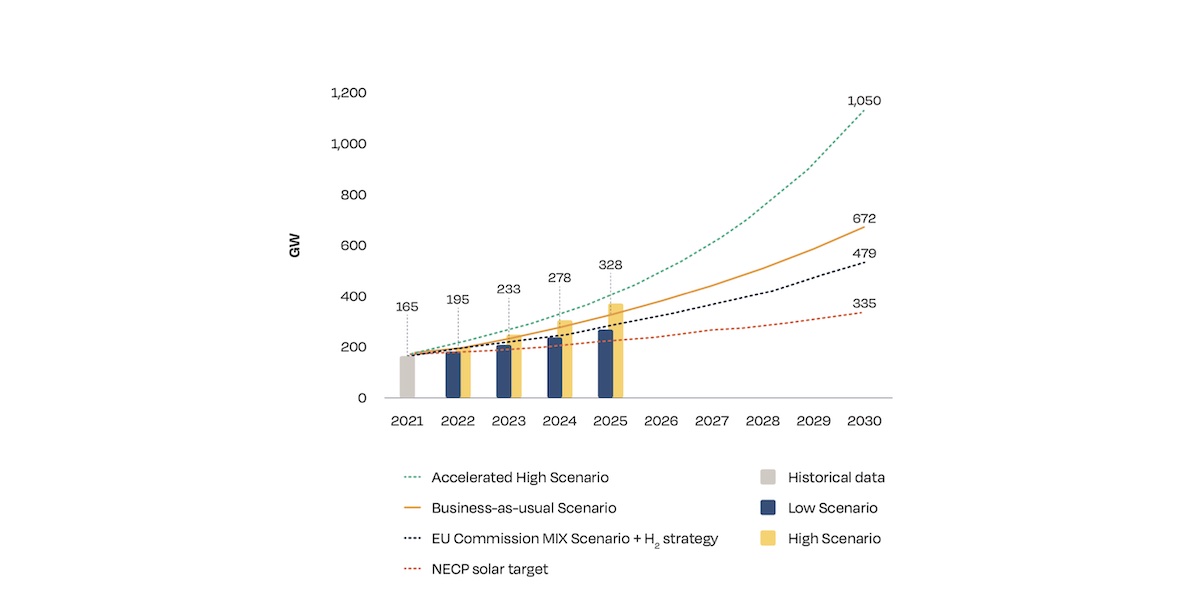SolarPower Europe proposed a package of new measures at its annual event in Brussels last week, including a plan to potentially install more than 1TW of PV by 2030.
The European Commission said it also wants to accelerate the expansion of photovoltaics in order to reduce dependence on energy imports from Russia. “It's a new sense of urgency,” said Energy Commissioner Kadri Simson in the opening session.
In a strategy paper released at the summit, Solar Power Europe said that 39GW of solar could be added in the short term to drop reliance on Russian gas supplies amid the ongoing invasion of Ukraine. The would be 3.7 times more than in the pre-war scenario for rapid growth, and 9.1GW more than in the business-as-usual scenario, if no further action is taken. For short-term measures, the association is primarily focusing on rooftop systems, as there are no approval process issues for them.
The strategy paper is a response to a public consultation process launched by the European Commission, which is open until April 12. It aims to develop a new strategy for the expansion of PV. This should help to ensure that 40% of the electricity supply is provided by renewable energy in 2030. According to SolarPower Europe's new scenario, this share would be increased to 45%.
The change in mood in Europe relates not only to the expansion of photovoltaics, but also to the manufacturing of PV components. Kadri Simson repeated the well-known quote from Italian Prime Minister Mario Draghi on the financial crisis: “We need to bring manufacturing back to Europe – whatever it takes.”
The “European Solar Initiative” industrial program, which SolarPower Europe launched together with EIT InnoEnergy, aims to achieve a production capacity of 20GW along the entire value chain by 2025. That includes polysilicon, ingots, and wafers, as well as the production of PV cells and modules. According to the pre-war scenarios, about half of the expansion in Europe could then be covered with such capacity.
Joaquim Nunes de Almeida, the director for mobility and energy-intensive industries in the DG Grow Directorate-General, also said that dependence on energy imports should not be exchanged for dependence on module imports. He said that the EU will therefore support the production of components.
With Wacker Chemie, there is a global player from Europe, at least in polysilicon production, which is already meeting the targets of the European solar initiative. However, the president of Wacker Polysilicon, Tobias Brandis, said that the high cost of electricity is one of the biggest hurdles to building up the value chain in Europe.
Wacker Chemie, which is also one of the world's largest players in the field of semiconductor silicon, needs 0.8% of Germany's electricity. In other countries, such as the United States, there are opportunities to support companies with electricity prices, which is not the case in Europe.
It is still unclear how the industry can be supported, as EU state aid rules have strict limits. But there is relative agreement that a renaissance in manufacturing can only succeed with innovative and sustainable products. That said, there could be disagreement over which technologies to focus on.
This content is protected by copyright and may not be reused. If you want to cooperate with us and would like to reuse some of our content, please contact: editors@pv-magazine.com.



By submitting this form you agree to pv magazine using your data for the purposes of publishing your comment.
Your personal data will only be disclosed or otherwise transmitted to third parties for the purposes of spam filtering or if this is necessary for technical maintenance of the website. Any other transfer to third parties will not take place unless this is justified on the basis of applicable data protection regulations or if pv magazine is legally obliged to do so.
You may revoke this consent at any time with effect for the future, in which case your personal data will be deleted immediately. Otherwise, your data will be deleted if pv magazine has processed your request or the purpose of data storage is fulfilled.
Further information on data privacy can be found in our Data Protection Policy.